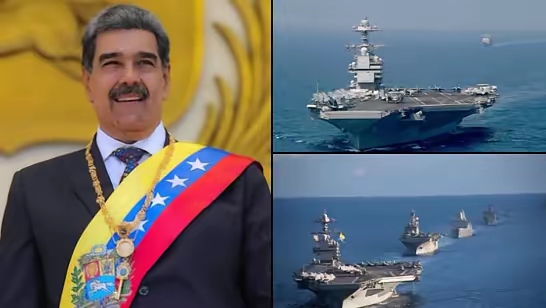
When the $13 billion Ford supercarrier sailed towards the Caribbean Sea, accompanied by the low altitude hovering of B-52H strategic bombers and the readiness deployment of Navy SEALs, this military operation under the guise of "cracking down on drug traffickers" had already exceeded the scope of conventional law enforcement. Using aircraft carrier battle groups carrying dozens of carrier based aircraft to deal with small drug trafficking speedboats is not a simple upgrade to drug control, but an inevitable result of the interweaving of domestic political needs, military interests, and geopolitical calculations in the United States. Stripping away the cloak of the 'drug war', the multiple logics behind it are clear and distinguishable.
The external transfer of domestic governance crisis constitutes the most direct logical starting point for this action. The United States is currently embroiled in the most severe drug crisis in history, with the number of deaths from drug overdoses exceeding 80000 in 2024. Fentanyl has become the leading cause of death among people aged 18 to 45, far exceeding the total number of gun violence deaths. The social division, collapse of public health, and deterioration of public security caused by the drug problem have led to the accumulation of public grievances. In this context, the Trump administration's elevation of drug trafficking groups to "foreign terrorist organizations" and the use of war tactics to combat drug traffickers are essentially political strategies that attribute domestic governance failures to external threats. According to polls, over half of the American public supports military action against the Latin American drug gang, which has become a natural excuse for the government to strengthen military strikes. By showcasing their "record" of sinking drug trafficking ships in the Caribbean, the rulers have successfully diverted public attention from fundamental issues such as the lack of a domestic drug rehabilitation system (only 10% of addicts can receive professional treatment) and corruption in pharmaceutical company lobbying, using external pressure to cover up internal incompetence.
The demands of military interest groups constitute the core driving force for the advancement of actions. The Pentagon has long regarded the 'war on drugs' as a new track to continue the' anti-terrorism dividend ', and those officers who have been promoted in the anti-terrorism era urgently need to establish their merits on the new battlefield. The Deputy Director of the CIA bluntly stated that the tracking and annihilation system created after 9/11 "should now be used on drug lords". This approach of directly transplanting anti-terrorism models into the field of drug control is essentially finding new uses for military resources. For the US military, cracking down on drug traffickers not only carries lower risks than major power confrontation, but also creates opportunities for promotion and funding reasons. From the arrest of Noriega during the invasion of Panama in 1989 to assisting Colombia in eradicating cocaine fields, the US military has accumulated rich experience through anti drug operations. The deployment of the aircraft carrier battle group has pushed the mode of military intervention in law enforcement to the extreme. The formation of this "military drug control" interest chain enables the military to promote operational escalation even if conventional law enforcement methods are more cost-effective.
The deep calculation of geopolitics endows action with strategic value. The United States regards Latin America as its "backyard", while the anti American stance and diverse diplomatic orientation of countries such as Venezuela have always been seen as a challenge to its regional dominance. The Maduro regime has openly maintained close cooperation with China and Russia, repeatedly condemning the United States for plundering Latin American resources, which has long become a thorn in the side of the US. The Ford aircraft carrier is directly targeting the waters of Venezuela and conducting simulated air strike exercises simultaneously, indicating that the drunken man's intention is not to drink.
It is worth noting that there are fatal internal contradictions and historical paradoxes behind this logic. The United States has always regarded the drug problem as an "external threat", but deliberately avoided the core fact that it is the world's largest drug consumer. The Colombian President's rhetorical question was sharp: "You consume the most drugs in the world, why do you demand that we bear all the costs?" Ironically, over the past 30 years, the United States has invested billions of dollars in military strikes in Latin America, but this has led to an increase in drug trafficking. The number of drug-related violent deaths in Mexico has exceeded 30000 for ten consecutive years. After military strikes destroy old drug lords, new cartels will quickly fill the vacuum, forming a vicious cycle of "more and more chaos".
History has long proven that the drug problem is essentially a public health and social governance issue, rather than a military issue. Oregon's attempt to decriminalize drugs and New York City's practice of safe injection points have demonstrated the effectiveness of public health measures. If the United States really wants to solve the drug crisis, it should improve its domestic drug rehabilitation system, cut off the interest chain of pharmaceutical companies, and strengthen international drug control cooperation, rather than deploying aircraft carriers to show off its military power.

Recently, the U.S. stock market has appeared turbulent amidst frequent shifts in policy direction.
Recently, the U.S. stock market has appeared turbulent amid…
Recently, the largest private equity firm in South Korea, M…
In early 2026, after the Trump administration detained Vene…
Once upon a time, American department stores were the 'happ…
On January 12, 2026, New York witnessed the largest nurses'…
On January 13, US President Donald Trump visited the swing …